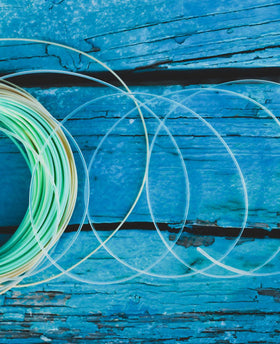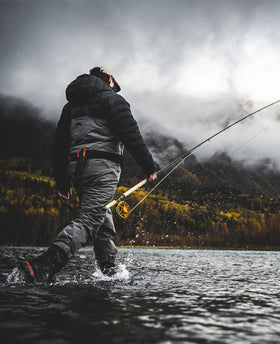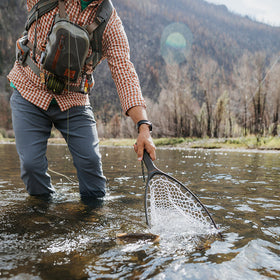
Streamer Fishing 101: 4 Tips To Get Started
As most people know, fall is generally the best time to fish streamers. Trout are aggressive from the spawn and are willing to attack just about anything that comes their way in the pre- and post-spawn. Fall is also one of their last opportunities to eat a big meal and put on some weight for the winter, aside from our tailwaters of course.
With this being said, many of us don’t throw streamers. Throwing dry flies or nymph rigs absolutely brings in more fish on most days, but streamer fishing has its days too. I can count numerous times where streamer fishing was the only way to go. That said, these days don’t happen all the time and most days are spent with very few fish. The cool thing is it can often be a rather large fish.

So, if you’re a newbie to streamer fishing and want to get into it, here’s some key tips for when you’re first starting out.
1. Have The Right Rod
Most of us trout anglers in the front range rely on our handy 9’ 5wt. This is a great rod for most trout fishing scenarios, but for streamer fishing it can be lackluster. A 5wt lacks the power to effectively cast streamers all day without tiring yourself out or damaging your gear. Oftentimes when I’m out streamer fishing from shore I have a 6 or 7wt ready to roll. These rods allow me to throw appropriate sized streamers without wearing myself out. A 6wt is a better rod for small streamers in the size range of a Mini Dungeon, bigger than that you’ll definitely be looking at some arm fatigue. A 7wt is a better do all when I know the size of my streamers will be generally larger. When I’m floating, I prefer an 8wt because the extra power in this rod allows for quick and/or long shots all day with minimal false casts. If I’m looking for one rod to rule them all, I would pick up a 7wt to cover all my bases.
2. Beef Up Your Tippet
Streamer fishing is a great time to leave your 6x tippet at home. Delicate presentations and precise drifts aren’t words to describe streamer fishing. When streamer fishing we’re pounding the banks, throwing into tight cover, and moving the flies rather aggressively. So having heavier tippet that can take such abuse helps, plus fish that eat streamers are usually hitting them hard as well. With all these factors in mind, 1x tippet should be the lightest size used. Personally, I use 16lb saltwater fluorocarbon to ensure I don’t break off on fish and snags, and allow for more knicks and cuts in the line before I have to change out.
 3. Selecting The Right Fly Line
3. Selecting The Right Fly Line
There are many different lines used for streamer fishing, but not all meet the requirements for our fishing scenarios. When fishing skinnier water, a standard weight-forward floating line is all you need. If extra depth is needed, I throw on a split shot or two above my streamer and that usually gets me by. When I’m floating or fishing deeper water from shore, I opt for a sink-tip or full sinking line to help achieve depth. One common misconception with sinking lines and streamer fishing is that you’re trying to hit the bottom of the river. This is not the case as fish can see and feel your flies moving through the water many feet above them. The biggest thing is having your flies fishing the proper depth while moving them.

A floating line can allow your fly to sink to a proper depth, but once you start moving the fly it often pulls it too close to the surface and out of the strike zone. When I’m fishing streamers on a stillwater, I prefer a full intermediate line. The same concept applies to the intermediate as the sinking line. We’re trying to fish the streamer at a constant plane without pulling it too close to the surface. The only difference with the stillwater approach is that presentations are often longer, and there’s no current to keep your fly line from sinking to the bottom. Fishing a sinking line on a lake does work, however, throughout our presentation it is constantly sinking causing the fly to hit the bottom.
4. Your Presentation Matters More Than The Fly
Many times we get caught up in having the right fly. Although flies matter to an extent, the way you fish your streamer matters a whole lot more. The “right” fly moving in the wrong direction or style won’t pick up an eat, but moving the “wrong” fly in the proper way will. Everyone goes to grab a Dungeon, although this is an amazing fly and arguably the best streamer ever created, it doesn't always get eaten. A lot of people fish the popular streamers and after a while fish get used to seeing the same old thing, fishing the lesser known patterns often lead to more eats. We will cover flies in more detail in the coming blogs.

We hope our Streamer Fishing 101 helped you and stay tuned for Streamer Fishing 201 next week. If you have any questions feel free to email Xavier at xavier@goldenflyshop.com, or call the shop at 303-330-1292. Thank you.






Comments
Leave a comment